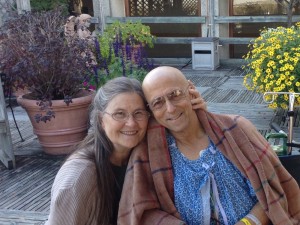We often think of being a peacemaker (if we consider it at all) as being a reconciler between two people or two groups. It may be a disagreement among friends or fighting children, or conflict within a business or ministry team. I remember working as a prison guard at a maximum security prison. I received a message over my walkie talkie to go to the exercise area in the yard and break up a fight in “the yard.” There I encountered two huge guys who looked like they could bench press my Honda Civic. I distinctly remember my voice cracking as I confronted these giants saying, “Excuse me men, but you’re going to have to accompany me to the captain’s office to resolve this matter.” Guards carried no weapons, but recognizing the authority in my trembling voice and 150 pound frame, they came along peacefully. 🙂
Maybe you have considerable angst over conflicting ideas, tactics or personalities. It might involve you and someone you love dearly. Then again, it might involve that certain person who constantly rubs you raw.
What does the bible say about this? Live at peace, love one another, consider the interests of others. Paul found common ground in being all things to all people. Hostage negotiators and international peace negotiators know the value of finding common ground that is in keeping with essential core values. It’s no less important for you and me. Do you ever find yourself getting in a heated argument that could be easily solved to the satisfaction of both? So it was in the classic story of two girls, each wanting the last orange. One wanted the orange pulp for juice while the other wanted the rind for marmalade. It’s not uncommon for two people to ultimately desire the same outcome (satisfaction for example) without realizing the answer is found in discovering each other’s interests.
Even if we can’t seem to discover any common ground, we can acknowledge our disagreement without acting in disagreeable ways. My step dad (who was always “dad” to me) advised me to never let the sun go down on my anger. Whether the conflict was between me and God, my loving spouse, a friend, or myself, sometimes the solution was to acknowledge the discomfort while also affirming my respect, love, and commitment to the other. It might sound something like this: “I recognize we have not come to a satisfactory solution yet, but I love you and I am committed to understanding your position more clearly ; I’m not going away. I’ll be here when we’re ready to resolve this important matter more calmly.” If you pray before leaving the issue for the day, be sure to ask for God’s guidance and wisdom, NOT for him to make the other person see YOUR way of thinking!
This seems to me to be a good approach for unanswered prayers! Time after time, we may have come before God pleading him to “see things our way” and bless “our plans. ” We may come with seemingly unbearable sorrow, disappointment or even anger to share. Don’t you think he already knows and understands? He’s a big God. Believe me, if the psalmist and later King David, who God called a man after his own heart, prayed this way, so can you. Just end with, “But Lord, I don’t want to remain feeling this way; I want to be closer. Draw me close to you in love and peace.
Becoming a peacemaker is not accomplished in a single blog post, or series of blogs or books. It is a lifetime quest. Jesus clearly demonstrated his desire to bring peace to common people like you and me, but not to those who persisted in rejecting his truth. He told his disciples there are times to persevere and times to “shake the dust from your sandals” and move on. Let the Holy Spirit guide you.
Like Joni Tada Erickson, sometimes the source of our conflict never changes… in this life. But we needn’t let that paralyze our desire and Spirit-led ability to remain faithful peacemakers with ourselves, with others, and God.




 r. One dollar per post ($24 per month) provides needed educational supplies and basic medicines where access to clean water is difficult.
r. One dollar per post ($24 per month) provides needed educational supplies and basic medicines where access to clean water is difficult.
 ad and write your own review of Go Light Our World at Great NonProfits:
ad and write your own review of Go Light Our World at Great NonProfits: 